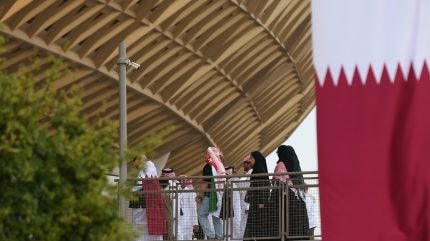
The news that Qatar could host the finals of the new Nations Championship rugby union competition could substantially impact the landscape of international rugby and inaugurate elite global rugby events in the Middle East, a region the sport has not previously entered at a professional level.
Saudi Arabia, the United Arab Emirates, and Qatar have been proactive recently in reshaping the global sports power structure. Middle Eastern stakeholders have ploughed money into marquee sport assets across soccer, motorsport, golf, and tennis. Rugby now seems to be next on the list.
Qatar’s bid would include six play-off matches between southern hemisphere nations and Six Nations teams over one weekend every two years from November 2026 at venues that hosted games during the 2022 FIFA World Cup.
The reported bid is offering significant commercial returns of up to $1 billion, funds that could be game-changing for the future financial structure of the sport at the professional, and indirectly, the amateur level.
The Gulf state proved it can host elite sporting events at the 2022 World Cup. The tournament produced historic matches and off the pitch generated exceptional revenues surpassing $7 billion.
The country’s bid to host the world’s best national rugby teams in a competition that changes the structure of international rugby is a logical development, as stakeholder groups, especially in Qatar and Saudi Arabia, seek to host and invest in many of the biggest sports properties.

US Tariffs are shifting - will you react or anticipate?
Don’t let policy changes catch you off guard. Stay proactive with real-time data and expert analysis.
By GlobalDataTaking the Nations Championship to Qatar could provide World Rugby with lucrative new sponsorship opportunities to help rugby federations balance their financial books.
The FIFA World Cup sponsorship portfolio included six deals with Qatar-based companies – Qatar Airways, QatarEnergy, Ooredoo, The Look Company, Qatar National Bank, and Gulf Warehousing Company. These firms collectively invested $144 million to partner with the biggest sporting event in the world.
World Rugby could pursue partnerships with Qatar-based brands willing to invest millions of dollars for sponsorship opportunities to make their brand visible in key rugby markets such as the UK, South Africa, Australia, and New Zealand.
GlobalData can report that the only Qatar-based brand to have agreed a partnership with a rugby property is the nation’s airline Qatar Airways. The national carrier has been a mainstay in partnering with major sport properties.
In 2023, Qatar Airways spent a substantial $172.3 million on 18 individual partnerships. Across the airline’s sponsorship timeline, four rugby deals have been agreed with the South African Rugby Union (SARU), United Rugby Championship, European Professional Club Rugby, and New Zealand’s largest sports stadium, Eden Park.
The most lucrative of these is a two-year partnership with the SARU, which GlobalData estimates is worth $1 million annually. Qatar Airways has secured a total of 10 title sponsorship agreements with sport properties.
Therefore, the airline could be viewed by World Rugby as a potential title sponsor of the Nations Championship, a role that would provide the company with a substantial branding opportunity at one of rugby’s biggest future competitions.
Attracting new brands to invest in the new competition will be essential for World Rugby to bring in much-needed funds that can be reinvested in grassroots programs and provide national federations with greater financial security to grow and protect the game.
Especially since the impact of the Covid-19 pandemic, rugby clubs, leagues, and federations have taken a massive financial hit, with rugby shareholders still paying off loans that were essential to keep players and staff in jobs.
The financial performance of many international rugby unions has demonstrated the commercial struggles of rugby. In April, Rugby Australia’s financial results showed a $9.2 million deficit with a warning of tough times ahead in 2024.
However, the 2025 British & Irish Lions tour to Australia should provide Rugby Australia with a substantial influx of revenue. The Lions series, which occurs every four years, provides lucrative sponsorship and broadcast opportunities to the hosting nation which is rotated between Australia, New Zealand, and South Africa.
Recently, New Zealand Rugby (NZR) has also seen its financial stability worsen and is expected to use up all its private equity investment funds from Silver Lake by 2031.
A presentation from NZR to stakeholders provided worrying details of lower-than-forecast revenues and higher-than-predicted costs and is concerned enough to create new cash-generation options.
In May 2023, South Africa Rugby’s annual financial figures reported a minor deficit despite record income and have reacted by seeking to double their sponsorship revenue by the 2027 World Cup.
This is set to be achieved through a new private equity deal, similar to the investment NZR received from Silver Lake. The potential deal with Seattle-based private equity firm Ackerley Sports Group would allow the investor group to take a 20% stake in South Africa Rugby.
The investment is not aimed at helping to grow the federation’s sponsorship portfolio but to provide it with funds to support and promote rugby across the country. Regarding the northern hemisphere Tier 1 nations, both the Welsh and Scottish rugby unions have announced concerning financial results over the past six months.
With the prospect of substantial investment from Qatar into international rugby, rugby federations will be closely monitoring the bid to host the tournament as new finance is vital for the long-term growth of the professional game, with grassroots rugby also benefiting from the investment.
Concerns will be raised, however, regarding the Gulf nation’s alleged human rights violations. Still, it would seem World Rugby decision-makers are keen to benefit from the nation’s riches which could be a game-changer for the financial security of the sport.



